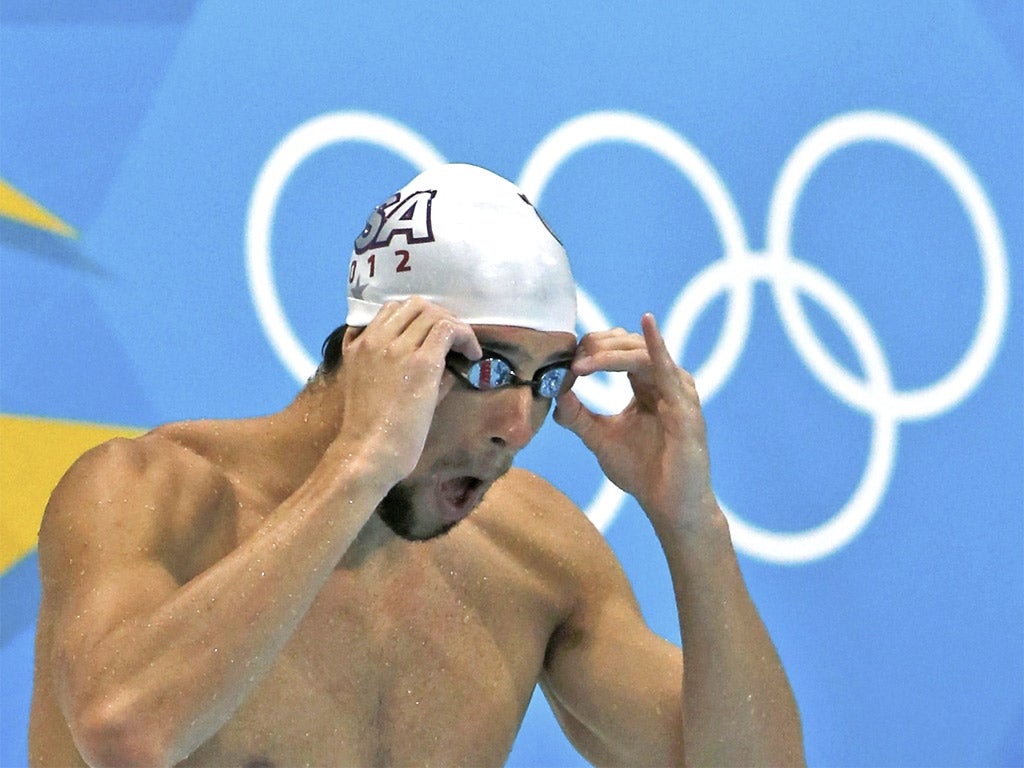The Independent's journalism is supported by our readers. When you purchase through links on our site, we may earn commission.
James Lawton: The appeal of the Olympics is the stunning possibility of exceptional deeds
As the Games officially begin today with football, Michael Phelps dips into the Olympic pool as athletes prepare to push themselves to new levels and excitement courses through the East End

They came into the Aquatic Centre here yesterday with the edgy demeanour of gunfighters and what they told us was the oldest story of the Olympics – the one that makes each new one, for all the controversy and the doubts, a fresh step into a potentially wondrous unknown.
Michael Phelps, the owner of 14 gold medals, made the big entrance, naturally, but alongside him was the fellow American who for some time has been threatening the man from Baltimore's last invasion of the pool.
The target set for Phelps by his brilliant coach Bob Bowman is seven more golds for a storehouse total of 21. Ryan Lochte, an upstate New Yorker now settled in the friendlier climes of Daytona, Florida, already owns the not negligible total of three golds and at 27 – the same age as Phelps – has a huge investment in swelling that number at his rival's expense.
Phelps may be one of the ultimate Olympians, a quirky, iconic cult figure for the most passionate followers of his sport, but Lochte doesn't need telling that a big impact here over the next week or so could project him on to a new level of celebrity stardom,
Some female admirers are saying he has the beefsteak appeal to step into the dusty footprints of Johnny Weissmuller, who several lifetimes ago translated five Olympic swimming golds into a huge Hollywood contract to play the part of Tarzan.
Times, and tastes, change of course but here yesterday we were reminded of that which supplies most momentum at the dawn of a new Olympics.
It is the aura of great athletes, their ability to inhabit the centre of the world for a few summer days every four years. Mark Spitz did it in the Olympic pool in Munich in 1972 and his achievements would have burnt that much brighter but for the slaughter inflicted on Israeli athletes and coaches.
Phelps did it in Athens and Beijing and, if there are any fears that the security of London 2012 has been compromised, there is no shortage of reassurance from the military personnel who were rushed to the scene of crisis. One paratrooper whispered that, given the wretchedness of his emergency accommodation, he might have elected to spend the next few weeks in an Afghanistan foxhole, but then he brightened and allowed that there was indeed a surge of excitement coursing through this recast section of the old East End.
No names, no ranks or serial numbers, of course, but the insignia – and the jaunty, engaging style – of some of the nation's finest fighting men are making a notable contribution to what, for the moment at least under an untrammelled blue sky, appeared to be growing levels of civic confidence. We can be pretty sure it will have moved to optimum levels by the time Danny Boyle's opening ceremony unfolds here on Friday night and Sir Chris Hoy, of the three gold medals in Beijing, carries the flag towards another significant haul of British triumph.
Yesterday, though, we saw the wider and more basic appeal of the Olympics. It is not to do – at heart, anyway – with the force of chauvinism or the blandishments of politicians with their airy talk of legacy and investment in youth, but the stunning possibility of quite exceptional deeds.
Phelps lifted the Athens Games, which were bedevilled by ballooning costs and political infighting, and in China four years ago Usain Bolt galloped through all the reservations over vast, unaccounted spending and neglected human rights. Of course, he didn't render them invalid, no one could do that, but he could remind us that for all the best intentions, the world still had a huge appetite for the most spectacular deeds.
Bolt, like Ben Johnson, before he was uncovered in Seoul in 1988, stunned the world, presented it with achievements which were not only stunning but challenged the imagination.
Phelps did that in both Athens and Beijing and yesterday he returned us to the possibility when he swung open the doors of the Aquatic Centre and threatened to once more shoot the lights out.
The most uplifting aspect of his story is that it is one of a renewal of ambition, a feeling, before it was too late, that he still had some serious performance to bring to the last days of his extraordinary Olympic journey.
Recently he was seen bringing his physical preparations to a peak of commitment. It included dragging a sled loaded with weights along the raw morning dockside of his native city. He also brought blood blisters to his hands by hanging from a metal bar.
"Being able to finish my career as I want to has become the most important thing to me," says Phelps. "I'm probably doing things that I hadn't wanted to do or hadn't done for as long as three years. Sometimes it feels like something is coming back to you from out of the past – some of the best of your best."
Phelps submits to a relentless regime of drug testing and puts a considerable slice of his $5m-a-year endorsement income into a foundation for young swimmers who have found in the sport some of his reward. The one, this is, that inclines a man to push himself to previously unimagined levels – and, along the way, enables him to put his own torch to the latest Olympics.
Join our commenting forum
Join thought-provoking conversations, follow other Independent readers and see their replies
Comments
Bookmark popover
Removed from bookmarks